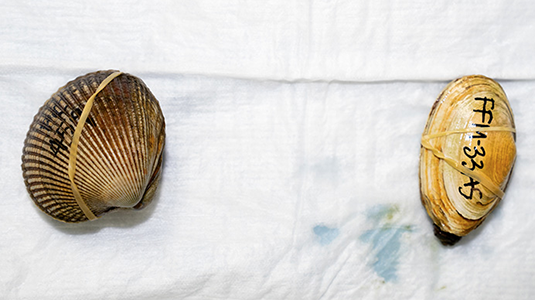— by Margie Doyle —

OPAL’s fundraising team celebrates reaching the 85 percent mark of money needed to break ground for the new April’s Grove rentals in Eastsound: (L to R) board president Tim Fuller, trustees Rusty Diggs and Margaret Mills, executive director Lisa Byers, and trustee and fundraising chair Pegi Groundwater.
“All” that’s left to raise is $2M of a $12M project that’s been in the planning for over three years of complex efforts to secure funding for “April’s Grove,” the affordable rental housing project of 45 units on four acres in Eastsound. OPAL Community Land Trust’s project will break ground early next year IF the last 2 million dollars are raised by Dec. 31, 2018.
As grant applications have been denied and refiled over the last three years, (see opal-rental-housing-project-not-funded-state-2016/ and opal-announces-progress-addressing-housing-crisis/ and opal-awarded-6m-in-tax-credits-grants-for-aprils-grove/), the terms of the grant and its financial impacts have changed. But now, that OPAL has secured:
- An award of $4,312,702 in federal Low Income Housing Tax Credits (LIHTC), confirmed in late April;
- Washington State Housing Trust Fund grants of $1,576,843;
- an award of $200,000 from the federal Community Development Block Grant program;
the last miles of this fund-raising journey to provide affordable rental housing on Orcas are on the horizon.
“When combined with donations from individuals in the community, plus funding already committed from San Juan County, the Orcas Island Community Foundation, other foundations and two loans, April’s Grove now has 85 percent of the money needed to build,” said Lisa Byers, Executive Director of OPAL Community Land Trust.
A dedicated fundraising committee, made up of Pegi Groundwater (Chair), Margaret Mills, Rusty Diggs, Helen Bee, Tim Fuller and Elaine Shiozawa, are committed to bringing OPAL Community Land Trust over the finish line by December 31, 2018.
The committee agrees that their mission involves meeting new friends and neighbors as much as raising funds, for this campaign is geared to new or “sporadic” donors to OPAL. As Margaret Mills says, “We’ve already gone to the ‘usual suspects’ in fundraising appeals.” In fact, when the first proposal for Federal funding was rejected, OPAL asked those who’d pledge to donate for three years to change that to five years. Most increased their pledge duration to five years, and in addition, many raised their pledge amount. OPAL board president Tim Fuller says, “It’s important to recognize the generosity of so many people in the community; people of some wealth have been very important.”
Helen Bee echoes those thoughts. “I can’t overemphasize OPAL’s ongoing enduring appreciation for the generosity of the community over the years, responding to a worthy project. The number of houses made available at an affordable price, an extremely well-managed project — none of this would happen without the support of the community.”
Now, however, OPAL hopes to raise the last 15 percent of the money needed, by appealing to “newer” island residents, whether they are young families or retirees who at last can fulfill their dream of being fulltime islanders. They also hope to reach out to new legacy donors who will invest in the future beyond their lifetime to secure a sustainable lifestyle for those who come after them.
Members of the fundraising committee come from varied backgrounds and skills, but all share commitment to the April’s Grove Affordable Rental Housing project as a way of giving back to the community.
Need for Rentals
The island has no emergency housing, and there’s a very low vacancy rate at OPAL rentals, currently just Lavender Hollow and the Reddick Apartments. There’s always a waiting list; and though some say the 45 units planned for April’s Grove are too many, all at once, they’re just the proverbial “drop in the bucket for Orcas,” fundraisers say. The last affordable rental units were created in the 1990s with Lavender Hollow, purchased by OPAL in 2011 and the Reddick Apartments across from OPAL Community Land Trust offices.
Although San Juan County doesn’t have a large population of homeless or rural workers (previous conditions of federal block grants), many islanders live in “substandard or tenuous” housing situations, lacking adequate utilities or insulation; or need to relocate for seasonal rentals.
Orcas can’t continue to be a place to come if there’s not affordable housing, say committee members. Margaret Mills adds, “It’s a challenge across the country. The need for affordable housing is everywhere; and at least Orcas can take this moment to act.”
Jim and Betsy Nelson made the April’s Grove property just northwest of the public school, available for OPAL in 2015. OPAL signed a purchase and sale agreement to acquire the nearly four acres on North Beach Road – across from Children’s House and north of the orchard where April the Cow lived for many years in order to build approximately 30 units of affordable rental housing in the first phase, with an additional 15 units to be built in the second phase. Of the 45 units planned:
- 21 units reserved for people below 50 percent of area median income
- 20 units reserved for people below 60 percent of area median income
- and 4 units reserved for those above 60 percent of area median income
Different populations will be served in the 45 townhouses, such as:
- seniors
- homeless
- disabled
- domestic abuse survivors
Tim Fuller incoming president of OPAL board, admits to going into fundraising “with some trepidation” but welcomes the challenge presented by community investment in rental housing. He started by interviewing people who could provide a perspective on the lack of affordable housing.
“I was looking to make sure we had the story right. Affordable housing is a conundrum across the country. I talked to people directly impacted, from folks living in tents, to School Superintendent Eric Webb about the difficulty of hiring teachers who need stable housing. Quality teachers researched [housing availability on Orcas] and felt they couldn’t afford to teach here.
“Less teachers equals more kids in the classroom, and too many makes it awfully difficult to nurture every child,” Fuller says. “Housing impacts our kids’ education in other ways too. Several kids I talked to about where they live, said it didn’t feel ‘safe,’ their most commonly used term. They felt keenly the need for a home where there was more structure, less chaos; where they could bring friends, without noise, distraction and people they didn’t know.
“Hope and dignity are other terms that come up,” Fuller says, and cites two young men who were seeking a career in the military, and needed to feel okay with leaving their Mom in a safe place.
Fuller also connected with working people who don’t have a “regular” place to live and says he hopes to communicate to people that the lack of affordable housing is a “really critical situation.”
He knows personally what it means to be unemployed after coming out of the military. He remembers going into the neighborhood grocery story with food stamps as a humbling experience, with “everybody wondering what was going on. “So I see affordable housing as an opportunity not just to have a place to live, but an opportunity to grow, be productive and passing it on — that’s something I can really throw my arms around. My wife and I have had some great opportunities and it’s about giving back.
“I’m optimistic the conversation has taken hold on the island. With15 percent of funding to go, that’s really good.”
The final campaign
Pegi Groundwater has been OPAL’s fundraising chair for a year. She took on the charge that Helen Bee had formerly handled so ably; now Helen is in charge of the Gala, scheduled this year for June 30.
Pegi says, “I’ve never done fundraising before, but I try to do something brand new every year.” That dauntless attitude has brought Pegi to overseeing publicity for the Historical Museum, serving as a SHIBA medical insurance volunteer with her husband Michael Moss, coordinating with the Coalition for Orcas Health Care (COHC) leading to her election as a Commissioners of the Public Health District board. “Challenging myself will keep my life interesting,” she says.
This fundraising campaign will focus on one-on-one meetings, following up on the appeal letter sent out to those who haven’t yet pledged to April’s Grove, including property owners who don’t live on the island.
The committee is prepared to explain the any different ways to give, from monthly contributions, which OPAL Office Manager Elaine Shiozawa oversees, to donor-advised funds through the Community Foundation, to IRA contributions for those 70-and-a-half-years or older which are untaxed, and Legacy Gifts. “We’re just trying to grow our donor base,” says Pegi,”to help people know who we are, who are the actual people who have need, and how funding can make a difference in their lives.
“We’re now reaching out to sporadic or new donors who haven’t specifically supported the April’s Grove project. The good news is everyone seems to get that we need affordable housing to have the kind of island we want to have.”
Outreach
Helen Bee says she acquired her fundraising skills for OPAL “on the fly. It’s time for me to make a change. OPAL has been fortunate to have people on board willing to take the task on — and Pegi is fearless!”
Helen describes the $2M goal as “a case of the ever-receding goal line.” The first grant application was for 30 townhouses, then “We added 15 to the first request for 30 and realized it was more cost effective to do 45. The great strengths of the OPAL application is the clear demonstration of community support, with very impressive donations,” she says.
Margaret Mills looks forward to reaching out to new donors.”The only way to make it to the next level is to expand the pool. This drive is not with people who’ve been on the radar, but with the seasonal folks who can now spend more time and see how things work, and with the next generation who settle in Orcas and have resources and understand the quality of life depends on the character of generosity.”
Margaret finds the fundraising endeavor to be a “model of teamwork that I really love and haven’t experienced before. This project has a lot of beneficiaries: people who need a place to live, and also the community who needs workers. It gives people the opportunity to have as much joy in the project as I do; really creating a community of commitment and appreciation.”
Rusty Diggs is an OPAL Bonnie Brae resident and the mother of twin girls. She sees board service as giving back. “OPAL save my life, and my family’s life. I can’t express that enough.
“All fundraising is new to me, and I’m new to the OPAL Board; but I feel so strongly about OPAL and wanted to be a part of the OPAL board and knew there was enough leadership that people would mentor me. I want to give people the opportunity to be part of April’s Grove. It’s more an invitation than pressure.
“Pegi asked me to be on the board and it took me a couple of months to say yes, because I didn’t want to let anybody down. Everyone knows we have lives; if I say yes, I want to be able to fully engaged. When my girls were young I didn’t even know the people who were helping me. This is my way of paying it back and paying it forward.”
OPAL Staff and Board
All fundraising committee members credit the “fabulous” leadership and staff at OPAL: Lisa Byers, Julie Brunner-Gaydos, Jeanne Beck, Judy Whiting and Elaine Shiozawa.”They know how to do this, and through all the setbacks they are super-positive, always strategic.”
Rusty adds, “When I agreed to serve, I was saying yes to the staff here, I didn’t know the people on the board. I knew that my experiences with Lisa, Julie, Jeanne and Judy would bring me to a new place of compassion and energy.”
Margaret agrees wholeheartedly, “The staff gives us so much backup, and the knowledge to do our tasks. They’re are incredibly competent and dedicated in their jobs; never mind educating me!”
Ensuring the future
April’s Grove is not a giveaway, Rusty says. “I’m sharing my equity for the next generation. It enables them to invest in Orcas. April’s Grove will make rents affordable, sustainable into the next generation. OPAL allows someone to have a stable place to:
- work
- pay taxes
- raise kids
- age at home
“The community is the beneficiary of the OPAL affordable housing projects. We all need services to live here; the school is desperate to have apartments for incoming teachers. It’s a shared equity model not a giveaway.
“And I believe the community is going to step up.”
Reaching the goal
The Orcas Island Community Foundation pledged $250,000 when all other funding is in place.
Margaret Milling says, “We welcome the support from anyone who sees the need. If we don’t meet the January 2019 deadline and have to roll over another year, the costs will increase. That’s a strong fiscal reason to push for full funding by the end of 2018. We can start site prep when the goal is reached. Everybody’s pulling together, we just need to get a little more pull.”
Tim Fuller says, “I’m truly optimistic because of the response in donations and pledging; the spirit in the community has been amazing; and there is an awareness of the real situation. I think I can help. We all can help.”
“Please can we break ground? we’re so close” Margaret Mills asks the community.
For more information about OPAL, April’s Grove, OPAL residents, board and staff members, go to https://www.opalclt.org
**If you are reading theOrcasonian for free, thank your fellow islanders. If you would like to support theOrcasonian CLICK HERE to set your modestly-priced, voluntary subscription. Otherwise, no worries; we’re happy to share with you.**








